Manhattan Voters: Next DA Should Hold Police Accountable, Stop Prosecuting Low-Level Offenses
New poll shows that New Yorkers want their next DA to tackle police misconduct and lead on reform.

The Manhattan District Attorney primary election is a week away, with eight candidates vying to lead the second largest local prosecutor’s office in the U.S. The next DA will inherit a $145 million budget and oversee over 1,500 line attorneys and support staff, setting a prosecutorial agenda on behalf of 1.6 million people.
According to new polling from Data for Progress and The Lab, a policy vertical of The Appeal, voters believe that agenda should start with a vision of public safety that doesn’t depend on the cudgels of unchecked police power and incarceration. Voters want their DA to hold police accountable for misconduct, and shift away from prosecuting minor offenses that are known to fill jails without providing the social support and healthcare that people often need.
In the poll of New York County (Manhattan), 86 percent of voters—including 90 percent of Democrats, 75 percent of independents, and 79 percent of Republicans—support the creation of an independent unit within the DA’s office to investigate police misconduct. Further, 80 percent of voters want their next DA to prioritize investigating and prosecuting police misconduct, and 68 percent want the office to focus on overturning past convictions where police and prosecutorial misconduct is found.
Additionally, the poll found:
- 52 percent of voters would be more likely to vote for a DA candidate who supports ending the use of cash bail, compared to just 32 percent who would be less inclined to vote for such a candidate;
- 69 percent of voters want the next DA to shift resources away from prosecuting low-level offenses—such as drug possession and disorderly conduct—to focus only on serious crimes;
- 61 percent of voters—including 65 percent of Democrats, 57 percent of independents, and half of Republicans—prefer candidates who promise to stop prosecuting consensual sex work;
- 52 percent of voters, including 68 percent of Democrats and 59 percent of independents, would be more willing to vote for a candidate who promised to stop prosecuting crimes related to homelessness and addiction.
These issues have been central to the Manhattan DA primary race, which will take place on June 22, as covered in The Appeal’s interviews with six of the leading candidates: Alvin Bragg, Tahanie Aboushi, Tali Farhadian Weinstein, Lucy Lang, Eliza Orlins, and Dan Quart.
Aboushi, Orlins, and Quart—who’ve pledged not to join New York’s historically anti-reform District Attorneys Association of New York (DAASNY) if elected—have promised a clean break with the past. Aboushi and Orlins have committed to cutting the office’s overall budget in half, whereas Fargadian Weinstein and Lang, both frontrunners, have not promised any reductions to the office.
On the question of overturning past convictions where police misconduct is found, all but Farhadian Weinstein signed on to a May letter calling for the DA to vacate convictions “whenever an NYPD officer is convicted of crimes relating to their duties.” Farhadian Weinstein, the financial frontrunner, declined to sign the pledge despite touting her experience in Brooklyn’s conviction review unit, which produced four exonerations under her leadership.
Seven of the eight candidates have vowed to stop prosecuting sex workers entirely, but only three—Aboushi, Orlins, and Quart—would advocate for a statewide bill to fully decriminalize sex work in New York. Farhadian Weinstein, by contrast, would continue to prosecute buyers and has backed a partial decriminalization bill in Albany. Lang and Bragg did not indicate support for either state bill.
Orlins, the only career public defender in the race, is committed to “not prosecuting the overwhelming majority of misdemeanors and low-level felonies” as a means of shrinking the office’s carceral footprint. Aboushi has identified over 40 offenses that she would decline to prosecute, saying that such prosecutions criminalize poverty and substance use disorder. Bragg also promises a declination policy to dismiss “petty offenses” or divert the accused person to a program outside of court, with “important but limited exceptions.” Quart has an 18-point list of offenses he would not prosecute, and Elizabeth Crotty, arguably the least reform-minded candidate in the race, won’t decline to prosecute any offenses, deferring instead to state lawmakers. Farhadian Weinstein also has not issued a decline-to-prosecute list.
Full Poll Results
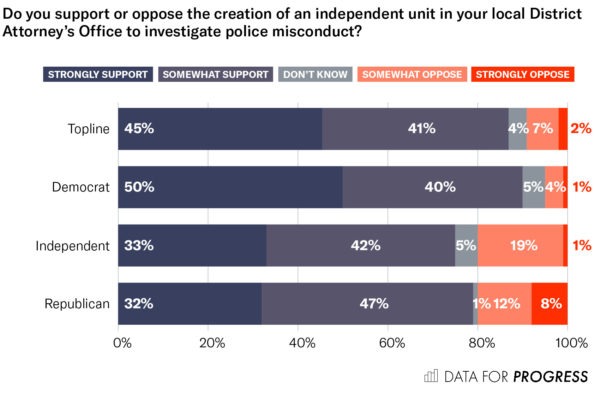
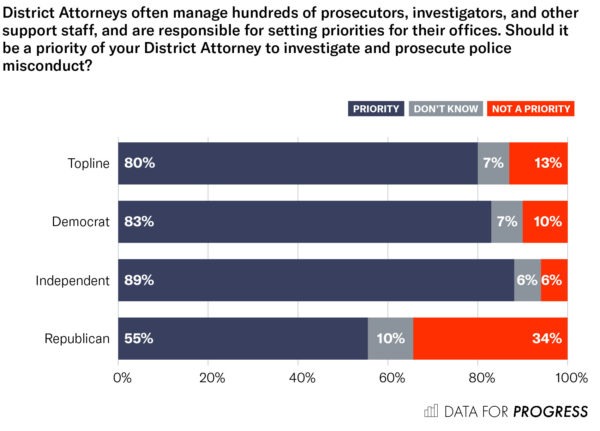
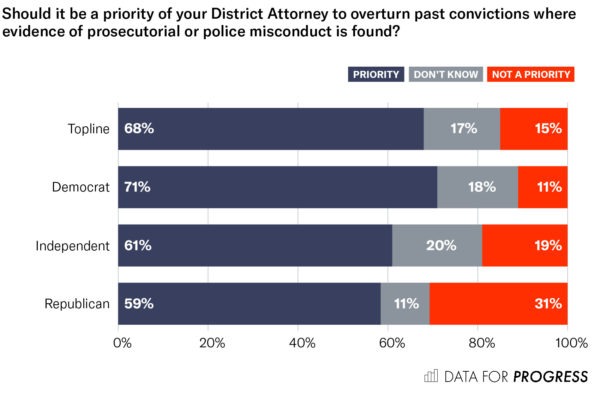
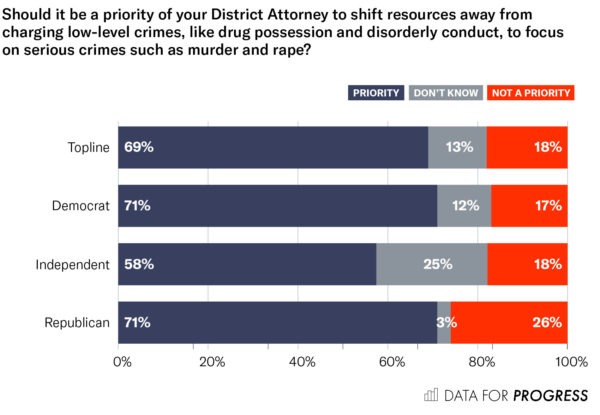
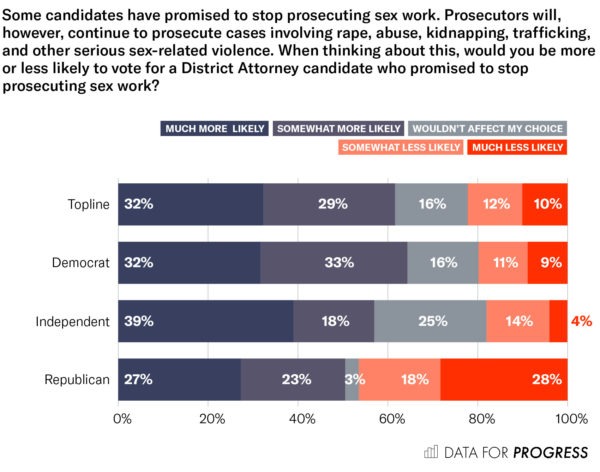
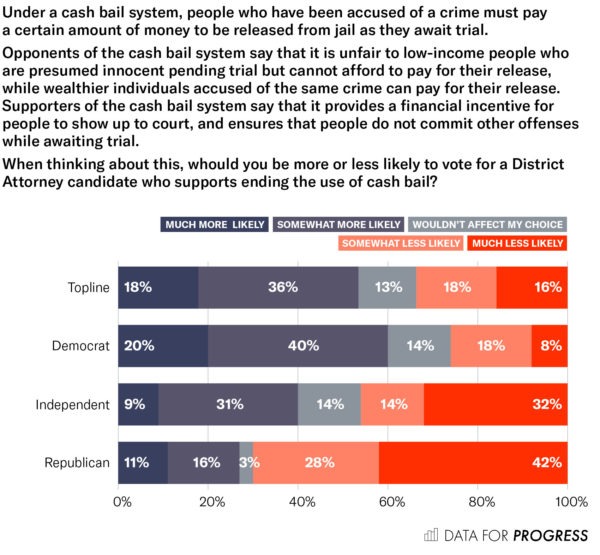
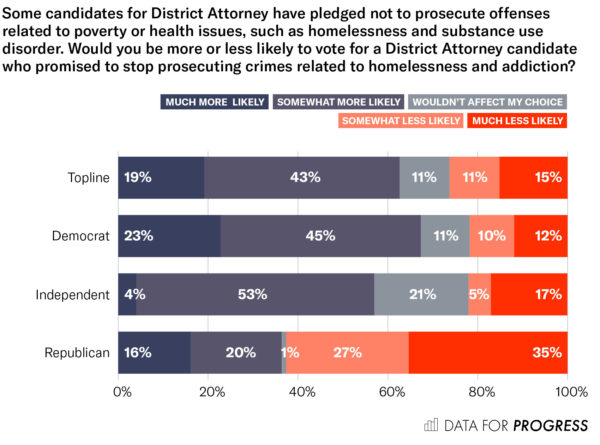
Polling Methodology
From May 28 to June 6, 2021, Data for Progress conducted a survey of 526 likely voters in New York County using web panel respondents. The sample was weighted to be representative of likely voters by age, gender, education, race, and voting history. The survey was conducted in English. The margin of error is ±4 percentage points.

